DUP leadership: How could the process affect power-sharing?
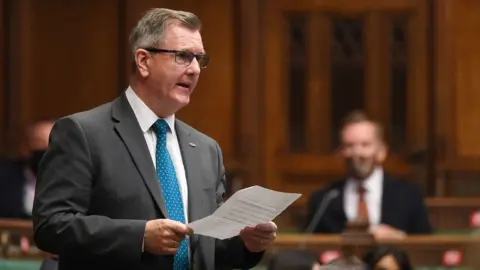 UK Parliament/Jessica Taylor
UK Parliament/Jessica TaylorThe Democratic Unionist Party (DUP) has appointed its second new leader in just two months.
Sir Jeffrey Donaldson was ratified as party leader on 30 June.
It comes after Edwin Poots was forced to resign following an internal revolt after just 21 days in the job.
That followed the ousting of former First Minister Arlene Foster following an internal revolt.
BBC News NI explains what the recent developments with the DUP could mean for the future of power-sharing at Stormont.
Why did Edwin Poots resign?
There are several key reasons behind his political downfall.
Mr Poots was elected to lead the party following a contest on 14 May, after he narrowly beat the DUP's Westminster leader Sir Jeffrey Donaldson by two votes.
He was criticised for not mentioning Sir Jeffrey in his acceptance speech and for his role in helping to oust Mrs Foster just weeks earlier.
At the ratification of his leadership on 27 May, divisions within the party were publicly and painfully exposed.
Claims of bullying and intimidation saw some members, opposed to Mr Poots' brand of leadership, resign.
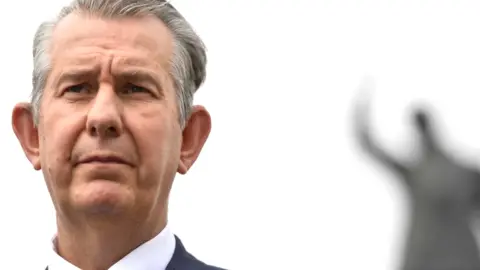 Press Association
Press AssociationBut it was not until 17 June that Mr Poots lost his short-lived grip on the party.
Having backed an agreement that same day with the government and the DUP's power-sharing partner Sinn Féin to allow Westminster to pass Irish language legislation in October if Stormont has failed to do so by then, Mr Poots wanted to nominate Paul Givan as the new first minister.
However, most of his assembly team and MPs were hesitant to do so and urged Mr Poots to delay the process.
After a tense meeting of MLAs and MPs, the DUP leader nominated Mr Givan anyway, but he overwhelmingly lost a subsequent vote that would prove the fatal blow to his authority after only 21 days in office.
A meeting of party officers later that evening confirmed Mr Poots would resign but remain in post until his successor was found.
So, what did the party do next?
Sir Jeffrey Donaldson is the DUP's fifth leader in its 50-year history.
Sir Jeffrey was ratified as party leader at a meeting of the DUP's central executive committee on 30 June after he was endorsed at a meeting of the electoral college on Saturday 26 June.
Only MPs and MLAs form the college and the 130-strong executive is made up of MPs, MLAs, peers and representatives from the party's 17 constituency associations and university groups.
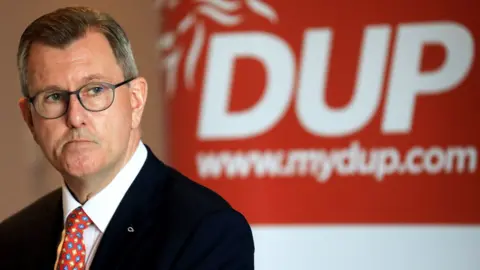 PA/Peter Morrison
PA/Peter MorrisonWho is the new leader?
Sir Jeffrey was the only person to submit a nomination paper this time round.
Just a month since the DUP's first-ever leadership election took place, second time around it was a coronation rather than a contest.
The Lagan Valley MP, who shares a constituency office with Mr Poots, had also thrown his hat into the ring during the first leadership campaign.
Party officers were trying fast-track the process in a bid to bring stability to the DUP.
Sir Jeffrey faced his first challenge just hours after his ratification when North Down DUP MLA Alex Easton announced he was quitting the party after 21 years as a member.
He said he was at the "end of his tether" and saw no "respect, discipline or decency" in the recent behaviour within the DUP.
Instead of all the attention being focused on his first major speech as DUP leader Sir Jeffrey fielded questions about the one who got away.
He has pledged to heal division, for which he accepts some responsibility but there is some distance to go.
What about the post of first minister?
For now, Paul Givan remains in post.
However, he has been informed by party officers that he will have to resign once a new party leader is in place. It is not clear precisely when that will happen.
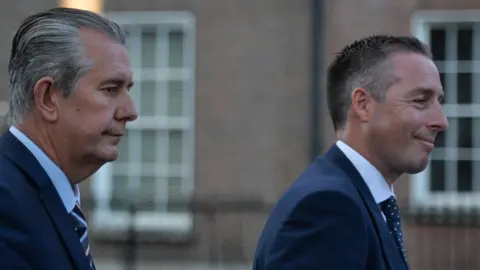 Getty Images
Getty ImagesA close friend of Mr Poots, Mr Givan is Northern Ireland's youngest first minister and could become the shortest-serving leader to hold the post.
In the first election contest, Sir Jeffrey said that if he became leader he would want to become first minister as well.
However, only MLAs can be first minister and therefore that presents a challenge for Sir Jeffrey, who is an MP.
Not only would he need a way to return to Stormont through a co-option process, which allows a party to replace an MLA without a by-election, but stepping down from Westminster would trigger a by-election in the Lagan Valley constituency.
He has held that seat since 1997 but in 2019's general election the Alliance Party's Sorcha Eastwood narrowed the DUP's majority and some in the party are concerned that it could be difficult to retain this time.
Then there is the added complication that when Mr Givan resigns it would lead to Michelle O'Neill's removal as deputy first minister and the DUP and Sinn Féin would then have seven days to fill the roles.
The posts are a joint office which must have the support of both parties.
If they don't nominate within seven days, the Northern Ireland secretary is legally bound to set a date for a fresh assembly election.
What happens next?
Nothing is predictable in Northern Ireland politics right now.
Ahead of Mr Givan being installed as first minister, there was concern that the institutions risked collapse.
That led to negotiations between the DUP, Sinn Féin and the government over Irish language laws, as Sinn Féin said it would not support Mr Givan's nomination without progress on that.
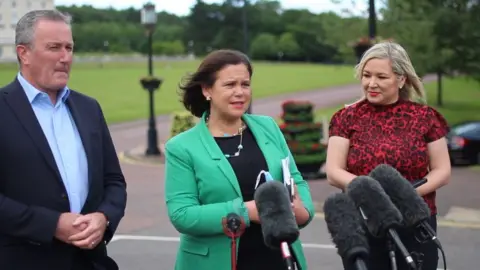 PA Media
PA MediaSinn Fein's Chris Hazzard previously said his party would not make any new demands during the process to nominate a first and deputy first minister.
However, before Sir Jeffrey's appointment, the Sunday Life reported that he would not nominate a first minister unless there was "significant change in the plans to bring in Irish language laws".
The new DUP leader will face pressure not to be viewed as having gone into government without making any gains for the party.
That could lead to another potential standoff, which would also affect day-to-day governance at Stormont.
For example, the power-sharing executive can only meet to take decisions on coronavirus restrictions when a first and deputy first minister are in place.
Faced with the prospect of fresh instability during a pandemic, events are expected to move at pace.
If the past two months are anything to go by, trying to determine how they will play out remains an impossible guessing game.
